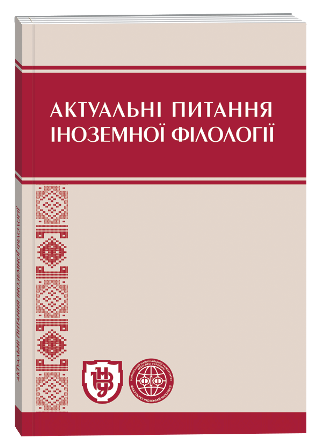GLOSSARY AS THE FORM OF STUDENTS’ SELF-DIRECTED ACTIVITY
DOI:
https://doi.org/10.32782/2410-0927-2022-17-9Keywords:
self-directed activity, glossary, vocabulary learning, extracurricular activity, thematic vocabularyAbstract
The article deals with the concept of students’ self-directed activities, its types, goals and forms of organization of this type of activity for their achievement while a foreign language mastering. More detailed attention is focused on the compiling a glossary or thematic vocabulary, the purpose of which is to systematize the studied professional vocabulary for further use in the process of reading and translating professional foreign texts. Mastering the thematic vocabulary is one of the most important tasks for professionally oriented translation. Researchers who dealt with the problem of compiling a glossary identified the main advantages of this type of work in the process of assimilating professionally-oriented lexical material, after analyzing which, we came to the conclusion that compiling one’s own dictionaries-glossaries: increases the student’s vocabulary; has an individual character; affects the quality of translations, therefore the author gives examples of compiling glossaries and methods of working with them,which expand their possibilities as an extracurricular type of educational activity, and reveals their motivational potential for active cognitive activity of students. Keeping a thematic vocabulary involves not a simple translation, but the cataloging, structuring and systematization of unfamiliar words, which has a beneficial effect on their memorizing. For this purpose, the author of the article provides examples of modern programs that are most appropriate to use in the process of organizing students’ independent work to compile a glossary in a foreign language. Thus, it has been established that the glossary is a useful tool that allows the translator to find the necessary equivalent easily, avoid inaccuracies when working with specialized terminology, and continuously improve the quality and speed of his work during the translation process.
References
Білозерська Л. П. Термінологія та переклад : навч. посібник для студентів філологічного напряму підготовки. Вінниця : Нова книга, 2010. 232 с.
ДСТУ 3966-2000 Термінологія. Засади і правила розроблення стандартів на терміни та визначення понять. Київ : Держстандарт України, 2000. 32 с.
Іваницький Р. В. Лексикографічні аспекти нормалізації термінів : автореф. дис. … канд. філол. наук : 10.02.04. Львів, 1995. 20 с.
Карабан В. І. Теорія і практика перекладу з української мови на англійську мову : посіб.-довід. Вінниця : Нова книга, 2003. 606 с.
Козаков В. А. Самостійна робота студентів як дидактична проблема. Київ : НМК ВО, 1990. 62 с.
Мага Т. М. Критерії складання тематичних глосаріїв. Перекладацькі інновації : матеріали VIII всеукраїнської студентської науково-практичної конференції (15–16 березня 2018 року). Суми : Сумський державний університет. 2018. С. 35–37. URL: https://essuir.sumdu.edu.ua/bitstream-download/123456789/67203/1/Maha_tematychnyi_hlosarii.pdf
Шуневич Б. Про упорядкування нових терміносистем. Вісник ДУ Львівська політехніка «Проблеми української термінології» : матеріали 6-ї Міжнародної наукової конференції («СловоСвіт 2000»). 2000. № 402. С. 85–87.
Dobrovolskiy D. Phraseologie und Sprachliche Weltbuld (Vorarbeiten zum Thesaurus der Deutschen Idiomatik). Deutsche Phraseologie in Sprachsystem und Sprachwendung. 1992. S. 171–196.
Dubiner D. Using vocabulary notebooks for vocabulary acquisition and teaching. ELT Journal. 2017. № 71 (4). P. 456–466.
Schmitt N., Schmitt D. Vocabulary notebooks: Theoretical underpinnings and practical suggestions. ELT Journal. 1995. № 49 (2). P. 132–143.







